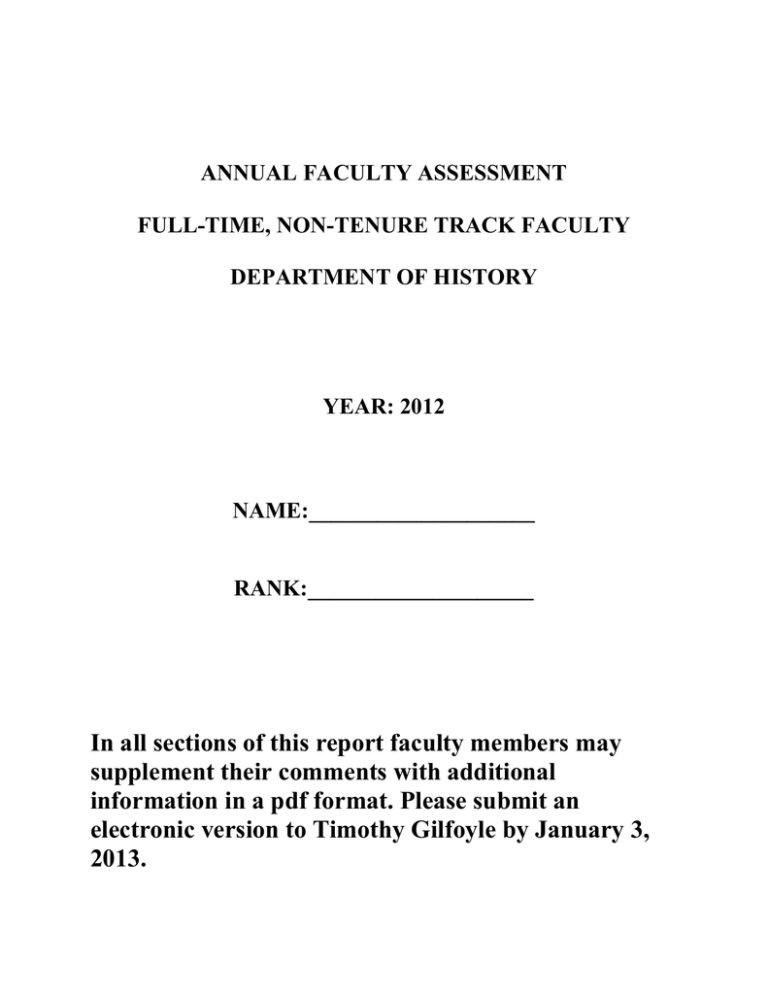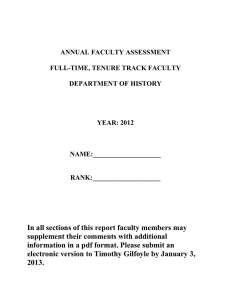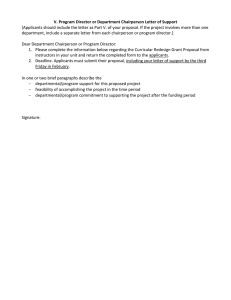ANNUAL FACULTY ASSESSMENT FULL-TIME, NON-TENURE TRACK FACULTY DEPARTMENT OF HISTORY
advertisement

ANNUAL FACULTY ASSESSMENT FULL-TIME, NON-TENURE TRACK FACULTY DEPARTMENT OF HISTORY YEAR: 2012 NAME:____________________ RANK:____________________ In all sections of this report faculty members may supplement their comments with additional information in a pdf format. Please submit an electronic version to Timothy Gilfoyle by January 3, 2013. History Department Annual Full-Time, Non-Tenure Track Faculty Assessment Criteria As you fill out your faculty assessment, please use the following criteria to guide your comments and the way in which you calculate your level of ranking. Please keep in mind that the Department of History expects its faculty members to produce excellent articles that are published in peer-reviewed journals and books that are released by noteworthy publishers. Such research results complement our emphasis on high-quality teaching and dedicated service. Numbers 1 through 5 correspond to a range of Poor to Outstanding. Teaching 1 Problematic performance in the delivery of course instruction, in grading, advising and treating students in a disrespectful and derisive manner, as documented by peer, departmental, and/or student evaluation or the generation of a number of student complaints; or unwillingness or inability to meet departmental curricular goals in development of courses. 2 Carries out all teaching responsibilities to a level of quality that minimally satisfies basic departmental expectations for effective teaching by meeting classes on time, providing organized syllabi, grading in a timely fashion, and using standard scholarship; provides acceptable and accurate academic advising; and behaves toward students in ways that show respect for them as persons and learners. 3 Consistently renders solid and effective work in the classroom as documented in the teaching portfolio by student evaluations as well as peer evaluations for non-tenured faculty; stays up to date in the discipline so that course content reflects new scholarship and/or utilizes new resources; engages in curricular or pedagogical development to improve classes; provides reliable, accurate, and effective student advising and mentoring; develops useful instructional materials for courses and students; personifies for students a commitment to disciplined and rigorous inquiry and concern respect for others. 4 Excellent teaching as documented by teaching portfolio; development of new courses; provision of instruction that is not credited to individual faculty such as independent studies and service on dissertation and examination committees; successful engagement of students in research or other appropriate professional activities; contributions that enrich the culture of learning on campus and in the city;. 5 Excellent teaching combined with exceptional service well over and above classroom teaching, e.g., supervision of three or more Ph.D dissertations or five or more Masters Essays during the year; or recipient of internal or external awards for superior teaching or being named graduate or university Faculty Member of the Year, teaching in a NEH or similar seminar, or providing leadership in regional or national efforts to develop and/or increase access to history teaching at any level. Service and Professional Development (if applicable) 1 Lack of initiative, dedication, or effective effort; behavior that impedes the achievement of departmental and institutional goals; or failure to perform one’s assigned duties to a minimally acceptable level of quality; lack of productive scholarly activity or coherent program of research, whether of discovery of knowledge or for application and integration. 2 Minimally useful activity, relative to rank and seniority, in service to the department, school, and university; no active participation in professional organizations; no coherent program of research (whether for discovery of knowledge or for application and integration), but publication of one or more reviews (including book, article, and MS reviews); and/or one or more papers delivered or published in local or regional venues. 3 Useful contributions, relative to rank and position, toward the achievement of departmental, school, or university goals and priorities. Examples include active service on committees, representing the department and/or university at internal and/or external events, and/or active participation in one or more professional organizations, through service on panels, juries, and/or committees; one or more ongoing, coherent research program(s) (whether for discovery of knowledge or for application and integration) that result(s) in archival research and/or evidence of ongoing writing, such as drafts of at least one of the following: chapter(s), paper(s) and/or article(s) (delivered or published); review(s) (including book, article, MS reviews); application(s) for externally funded fellowships or research grants. 4 Useful service plus production of valuable results on projects of importance to the institution and/or the profession, and/or the uncompensated contribution of one’s time and professional expertise for the benefit of society; one or more coherent, ongoing research programs (whether for discovery of knowledge or for application and integration), which result(s) in one or more of the following: paper(s) and article(s) (delivered or published in nationally recognized venues and peer reviewed journals); substantial review(s) or historiographical essay(s) published in peer-reviewed publications; exhibit(s) in local museum/historical society or on websites; receipt of externally funded research grant(s) or fellowship(s); editing a scholarly journal or book series. 5 Excellent service combined with consistently effective leadership within the university or at the national level. This service might include serving as president of a national organization, leadership of Academic or Faculty Council or a University Policy Committee, or Director of an area studies program; one or more coherent research programs (whether for discovery of knowledge or for application and integration), which result(s) in one of the following: several papers and articles delivered or published in nationally or internationally recognized venues of the highest caliber; book(s) published by academic or commercial press; major exhibit at nationally-recognized venue, receipt of prestigious external research grant; award for published scholarship. Teaching List the courses taught during spring and fall semesters of the calendar year (do NOT include summer session courses), enrollments, TCE instructor rating and course rating, the number of evaluations submitted, and final grade point average for all students in the course. Then other possible subjects for comment include competence as a teacher (e.g. honors earned, honors nominated for, other recognitions); new courses prepared/taught; academic student counseling; availability to students; peer evaluations; involvement with teaching development activities; additional work with students (e.g. independent studies courses, graduate exam committees, M.A. or dissertation committees, graduate student advisement). Course (# of evaluations submitted) Enrollment TCE Instructor TCE Course Final GPA Rating (Mean) Rating (Mean) (based on 4.0 scale) Chairperson’s summary. Subjects will include salient areas of the faculty member’s comments (above). Faculty Member’s assessment of performance: below expectations meets expectations exceeds expectations /__________/__________/__________/__________/ 1 2 3 4 5 Chairperson’s assessment of performance: below expectations meets expectations exceeds expectations /__________/__________/__________/__________/ 1 2 3 4 5 Service and Professional Development Faculty member’s summary. Possible subjects for comment include profession-related outside activities that enhance the university’s reputation; membership on departmental, school, and university committees; administrative work; university offices held (elected or appointed); participation in student activities; responsible conduct in meeting professional obligations. Chairperson’s summary. Subjects will include salient areas of the faculty member’s comments (above). Faculty Member’s assessment of performance: below expectations meets expectations exceeds expectations /__________/__________/__________/__________/ 1 2 3 4 5 Chairperson’s assessment of performance: below expectations meets expectations exceeds expectations /__________/__________/__________/__________/ 1 2 3 4 5 Faculty Member’s Summary Assessment (overall self-evaluation with respect to departmental standards in both areas): Faculty Member’s assessment of performance: below expectations meets expectations exceeds expectations /__________/__________/__________/__________/ 1 2 3 4 5 Chairperson’s Summary Assessment (based on evaluation of faculty member’s performance with respect to departmental standards in both areas): Chairperson’s assessment of overall performance: below expectations meets expectations exceeds expectations /__________/__________/__________/__________/ 1 2 3 4 5 Faculty member’s response: ______________________________________________________________________________ Signatures: Faculty member_________________________________ My signature means that I have read and discussed the Chairperson’s comments and recommendations, not that I necessarily agree with all of them. Chairperson________________________________ Date____________ ****************************************************************************** Comments by dean: CAS Dean__________________________________ Date____________ Graduate School Dean______________________________ Date____________

